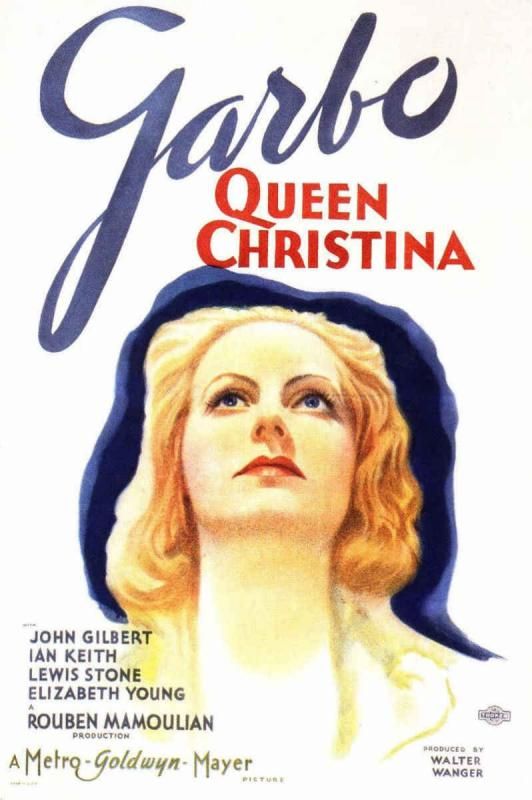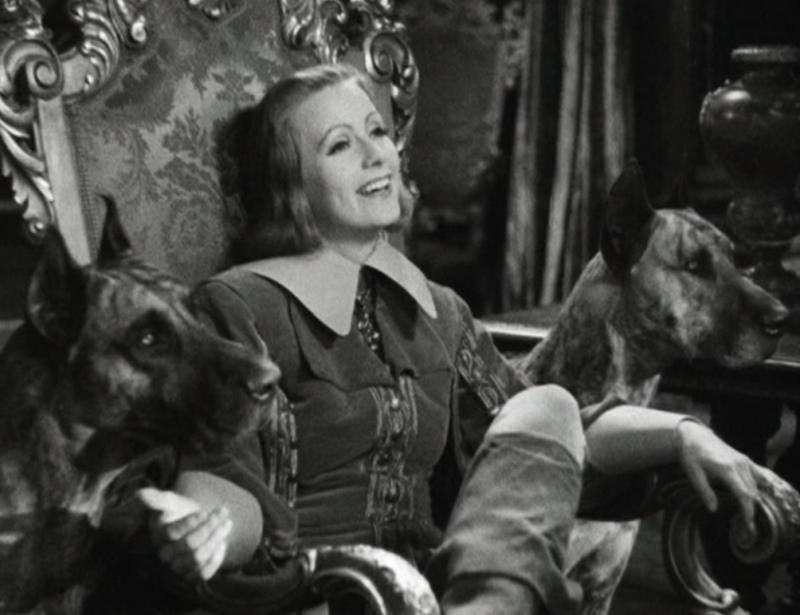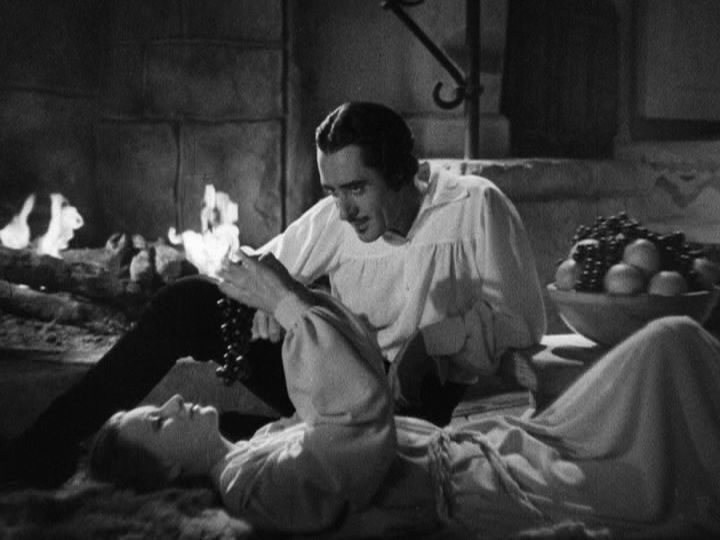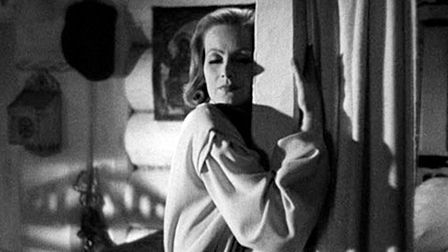Queen
Christina
1933
Director: Rouben Mamoulian
Starring: Greta Garbo, John Gilbert,
Ian Keith
Biography
films aren’t really my cup of tea, let alone biography films that cherry pick
certain events or characteristics to portray a white-washed version of a real
person. Queen Christina is better
than most early Hollywood biographies, but honestly, that’s not saying
much. Garbo is good, but the sentimental
nature of the story is overpowering.
Queen
Christina of Sweden (Garbo) ascended the throne at six years old after her
father, who raised her as a boy, died in battle. Grown, she maintains many masculine
sensibilities like wearing men’s clothing, riding, and hunting, all while
maintaining several (male) lovers, most notably in the form of Count Magnus
(Keith) who’s a bit of a hothead. Sweden
is in the middle of the Thirty Years’ War and Christina rules her kingdom well,
sacrificing much in the name of honor and duty, but she is growing tired. One night, trapped at an inn in the middle of
a snowstorm, she must share a room with the Spanish ambassador, Don Antonio
(Gilbert). The two quickly fall in love. Christina soon realizes that politics and
romance do not make comfortable bedfellows.
I
enjoyed Garbo pretty well as Queen Christina.
She plays the queen with an unrelenting confidence tempered by an
extraordinary sense of duty which is hard for me to dislike. From a feminist standpoint, I appreciate that
Christina doesn’t crumble into a heap of nothing once she falls in love with
Don Antonio. The movie does NOT have
just the message that she was somehow living a worthless existence until she
met the right man (although that is tinged around the edges, I admit), but
instead, we see that Christina is strong and meeting Antonio is simply a
significant chapter in her life. Garbo
is a natural fit for this type of character, one who can be lit on fire with
passion but who can also utter proclamations, one who loves her people but also
craves solitude. Being Swedish herself,
I can imagine that Garbo felt more connected to this role than others. In my head, Christina is someone she
identified with very much.
But
if Christina is strong, I find most of the men around her, including Antonio,
to be prissy little drama queens.
Antonio is all pissed-off and childish when he finds that Christina
deliberately did not tell him of her true identity. Dude, she’s a queen. She figured you’d judge her – just like
you’re judging her now. And what is
there unique about Antonio that makes Christina fall so passionately in love
with him? Blowed if I know. He seems so thoroughly average, such a run of
the mill standard issue “Hero” with all the heroic traits one might
expect. And then there’s Magnus,
Christina’s former lover whom she jilts in order to have sexy times with
Antonio. If Antonio gets a bit bitchy,
it’s nothing to Magnus. Why are all
these men so utterly adolescent? Whining
and scheming and gossiping, they’re worse than my high school students. I honestly lose respect for Christina for
picking Magnus at any point in the film because he’s so slimy and
immature. Dear lord, woman, what was the
attraction there?!?
SLIGHTLY
SPOILERY, BUT NOT ANY MORE SO THAN IF YOU WERE DOING A GOOGLE SEARCH ON THE
ACTUAL QUEEN CHRISTINA
I
have some problems with the ending of the film as well. I really wish that Mamoulian had simply
finished the story after Christina’s abdication. Up to that point, I understand that Christina
is abdicating not just because she fell in love, but because she is tired of
sacrificing absolutely everything to her country. It’s not wrong to make that sacrifice, but
she wants to live her own life, not Sweden’s.
I’m with you, honey. I smell what
you’re stepping in. The last fifteen
minutes, however, completely undermine all of that and try to bring it back to
a soppy romance flick, which vastly undercuts Christina’s power as a person,
making her out instead to be simply “another lovesick woman.” The duel was pointless to me, putting the
focus unnecessarily on Antonio instead of Christina – it makes the climax of
the film shift from Christina’s abdication (what it SHOULD be, given the title
of the film) to a duel between two men.
I don’t give a flying you know what about the petty squabbling of
Antonio and Magnus. Their fighting over
her drags her down to their level and completely saps her of any feminine
independence. It would have been a far
more powerful end if it was simply her leaving her court. I know the actual final shot of the film with
Christina on the bow of a ship is heralded as one of the most memorable of the
film, but there would be ways to achieve that same effect without the stupid
men fighting over her sequence.
OK
DONE WITH THAT.
Mamoulian
has some pre-Code fun with Queen Christina, mostly around the
idea of Christina dressing like a man.
When Antonio first meets her, for example, he has no idea she’s a woman
(a fact I didn’t buy for a second, by the way, what with Garbo’s clearly shaped
breasts and fake eyelashes), and when he later finds out, his reaction is
priceless. The segment where Antonio and
Christina shack up in the inn is sultry and passionate, and has enough clear
statements of sexuality that I’m certain it would have been censored in the
years that followed.
I
read up a bit on the actual Queen Christina while watching this film (because
frankly, it bored me a little) and discovered that the filmmakers actually
significantly toned her down. The
romance with Antonio was mostly a fabrication, but reports vary as to her
actual sexual appetites. The real
Christina seems even more colorful and salacious that we get here, sleeping
with possibly both men and women and rather hell-bent on doing things she
shouldn’t (an affair with a priest, for example). If anything, Hollywood toned DOWN the true
stories, even for a pre-Code film.
Honestly,
when it comes down to it, I’m remarkably ambivalent about Queen Christina. I neither like it nor dislike it. And that fact in and of itself is a bad
sign. A film should register somehow,
somewhere, for me, and this one is just… there.
That’s it. Is it good? I guess.
It didn’t make me apoplectic or anything. But it also never drew me in to its
world. It never intrigued me. I liked Greta Garbo, but I didn’t fall in
love with her. I felt completely
disengaged the entire time.
Arbitrary
Rating: 5/10 for a thoroughly middling film. Good Garbo, everything else was just there, and what could have been a huge POW! for feminism is massively undercut by unnecessary focus on the men.



